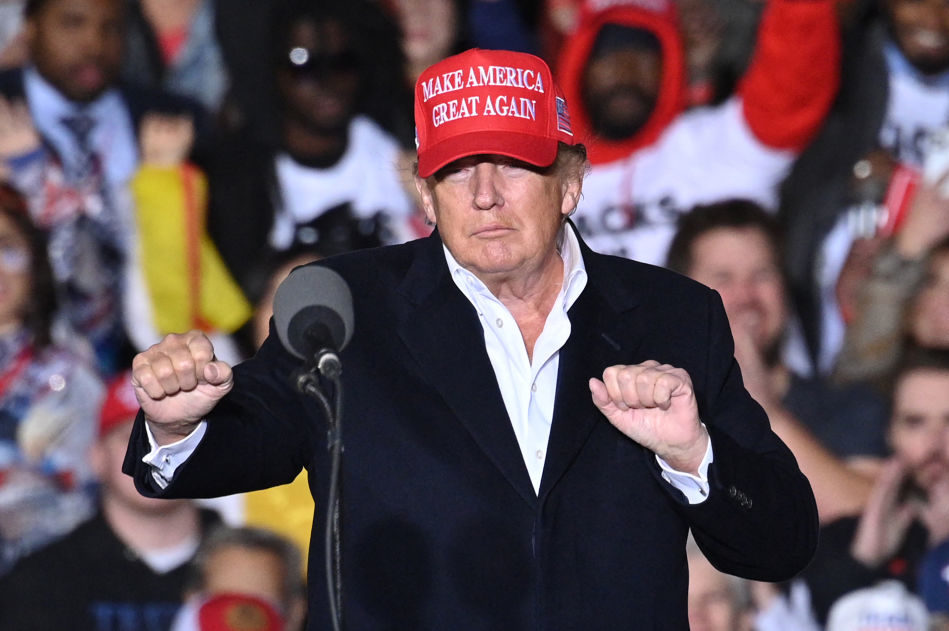Are we past peak Trump?
When it comes to prognostications over Donald Trump’s future role in US public life, everyone comes to the question with enormous amounts of baggage.
On the one hand, there’s a great deal of motivated reasoning from those desperate for the former president not to be the Republican nominee in 2024. They jump on any sliver of evidence that Trump isn’t the omnipotent ruler of the American right and tell themselves everything is going to be OK.
On the other, there are those who look at recent US political history and conclude that betting against Trump is generally a bad idea. It is an understandable view. From Access Hollywood to January 6, Trump has time and again disproved suggestions that his latest transgression has sealed his fate. If you adopted a policy of assuming Trump’s enduring popularity, you have been right more often than you have been wrong in the past half-decade — except, of course, for the 2020 election.
Notwithstanding that electoral slip, it’s not hard to see why so many take one look at the Republican Party and stick with the assumption that the nomination is Trump’s if he wants it, and that the only question is whether he decides to run. But there is mounting evidence to suggest that Trump is far from invincible.
There’s the growing Don/Ron feud we spotlighted earlier this week. Trump’s concern that the Florida governor won’t “say the magic words” and give him a clear run suggests he appreciates his apprentice-turned-rival’s talents. In Virginia, Glenn Youngkin is getting to work as a conservative but decidedly non-Trumpy Republican: not a 2024 rival, but a reminder that the Trump playbook is not the only option available to the GOP.
Then there’s the NBC poll published this week which found that 56 percent of Republican voters are more loyal to the party than to Trump, whereas 36 percent are more loyal to the former president. It is the biggest gap between the two numbers since the pollsters started asking the question. For most of his presidency, the numbers were more or less reversed.
Over at the Cook Political Report, Amy Walter and David Wasserman brings news of private Republican polling that “has found Trump’s lead over the GOP governor varies from 25 points in the Deep South to single digits in the Midwest, with a tie among GOP voters familiar with both.” Politically convenient private polls should be taken with more than a pinch of salt, but these numbers get at one of the difficult things about assessing Trump’s future: that a recently departed president always looms large. As other candidates become better known, perhaps his lead will start to look assailable.
Meanwhile, Trump’s crusade against Mitch McConnell has been notably lonely. Candidates have mostly not yielded to the pressure to come out against the Senate veteran. Now Politico reports that Donald Trump wants to double-dip with his primary endorsements. The former president is suspicious of his advisers’ recommendations and wants two chances of winning. It’s a revealing tidbit. It makes clear just how much of Trump’s endorsement game as about being seen to be the party’s kingmaker: backing a winning horse and then claiming the credit. It’s also by no means the behavior of an all-powerful leader who knows he is in complete control of his party.
All of this must be kept in proportion, of course. Trump remains an enormous figure, the most powerful Republican in America. It is perfectly possible he is the candidate in 2024. Indeed, even a much weakened Trump could make it through a crowded primary field. But he really does appear to be in a weakening position. And his previous death-defying political feats should stop observers from saying so.
*** Sign up to receive the DC Diary in your inbox on weekdays ***
President-senators and senator-presidents
Lost in the headlines about Joe Biden’s Ukraine freestyling and refusal to acknowledge that election in the United States are free and fair was the big picture takeaway from the president’s one-year “reset”: that it is no such thing. At least when it comes to substantive policy, Biden showed no signs of course correction. Yes, he said that Build Back Better would have to be broken into smaller pieces. But that is merely an acknowledgement of reality, not a strategic decision. Which parts of the legislation will fall by the wayside? The White House doesn’t want to say. (And Democratic factions on the Hill seem as determined as ever to make sure their pet policy makes the cut.)
And so the reset is stylistic. Biden will get out and about more, a prospect that presumably filled Democrats running in November with dread. The New York Times reports that the president plans to spend less time involved in Washington negotiations in his second year in office. “The public doesn’t want me to be the ‘president-senator,’” Biden said on Wednesday. “They want me to be the president and let senators be senators.” In a call with Democratic colleagues yesterday he also said that “we basically have fifty presidents in the Senate.” President-senators and senator-presidents. This is starting to get confusing.
Nancy’s best and brightest
I hope I don’t offend any readers when I say that the House of Representatives is not American public life at its finest. Not according to Nancy Pelosi. In a press conference on Thursday the leader of the House described the Democratic caucus as “the greatest collection of intellect, integrity and imagination.” A powerful imagination was on display when Mondaire Jones, a Democrat from New York said Thursday that “we are living through the worst assault on the right to vote since Jim Crow. And yesterday, on the Senate floor, white nationalists used the Jim Crow filibuster to block voting-rights legislation.”
What you should be reading today
Leon Hadar: Europeans are still free-riding off American security
Matt Purple: Our puritanical left-win elect
Batya Ungar-Sargon: When progressives side with criminals
Matthew Kassel, Jewish Insider: New poll shows that Marjorie Taylor Greene is vulnerable in primary match-up
Christopher Cadelago, Laura Barron-Lopez and Sam Stein, Politico: It’s Ron Klain’s turn in the barrel
Lola Seaton, New Statesman: The liberal platitudes of Michael Ignatieff
Poll watch
President Biden Job Approval
Approve: 40.5 percent
Disapprove: 55.3 percent
Net approval: -14.8 (RCP Average)
Satisfaction with America’s abortion laws
Satisfied: 24 percent
Dissatisfied, want stricter laws: 22 percent
Dissatisfied, want less strict laws: 30 percent (Gallup)

























